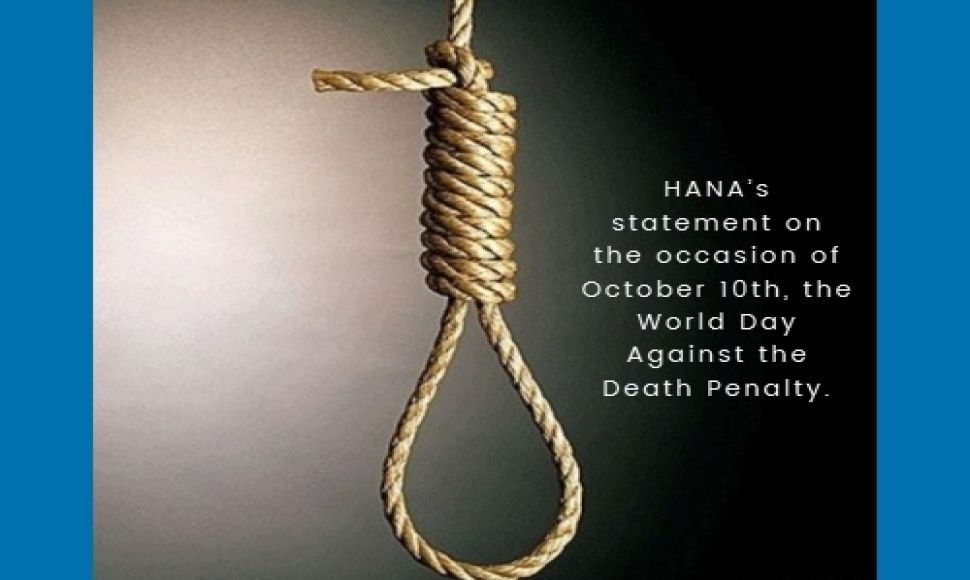Announcements
Hana's Statement on October 10, World Day Against the Death Penalty
03:04 - 10/10/2024
The death penalty is a form of punishment marked by violence and cruelty, another face of premeditated murder that has been widely enforced throughout history in many countries, including those under religious, fascist, and dictatorial rule, often for political, religious, and revenge-based motives.
After the Islamic Republic of Iran came to power in 1979, a new wave of violence against dissidents, various intellectual and political groups, and religious minorities began. The death penalty became one of the main tools of repression in the hands of the dictator. Following the revolution and the rise of violence and suppression of opponents, Ayatollah Khomeini, the then-leader of the Islamic Republic of Iran, repeatedly referred to them in his speeches as "reactionary infidels and conspirators." Finally, on August 19, 1979, Khomeini directly issued a fatwa for jihad in Kurdistan.
Sadeq Khalkhali, the Sharia judge and Khomeini's envoy in Kurdistan, initiated a new phase of executions in Kurdistan by executing nine people, including two members of a family, on charges of "participation in the events of Mariwan and waging war against the Prophet of God." The executions of the 1980s under Khalkhali in Kurdistan were mostly carried out in courts lasting only five or ten minutes, without the right to defense, submission of evidence, or access to legal representation, with accusations of waging war against God. Khalkhali himself stated regarding justice in his courts: "Do not worry about your children; if they are innocent, they will go to heaven."
Thus, the Islamic Republic used executions to consolidate its power without incurring significant costs. Executions in the Islamic Republic have been ongoing, and it is believed that Iran has the highest execution rate per capita in the world. According to a 2023 report from Amnesty International, Iran carried out the most executions globally that year, placing it at the top of the list of executing countries.
Under the rule of the Islamic Republic, executions are particularly prevalent in ethnic regions. Amnesty International confirmed in a 2023 report that 172 people, including six women, were executed in Balochistan. Furthermore, according to the Hana Human Rights Organization, from October 2023 to October 2024, 123 people were executed in the provinces of Kurdistan, 16 of whom were executed on charges of waging war against God. Based on reports received by the Hana Human Rights Organization from the families of those sentenced to death in Iran, especially in Kurdistan, prisoners on death row are in dire conditions. They are deprived of basic human rights, such as access to health care, the right to visits, and access to independent legal representation. They are also subjected to physical and psychological abuse, which raises serious concerns regarding human rights violations in Iranian Kurdistan.
After the execution of four Kurdish political activists—Mohsen Mazloum, Vafa Azarba, Hajir Faramarzi, and Pejman Fatahi—which was met with condemnation from international communities, human rights organizations, and political and civil activists, the Islamic Republic did not cease its repression but expanded it further. According to Hana Human Rights Organization statistics, only in August 2024, 12 Kurdish citizens, including Reza Rasai, a protester arrested during the "Women, Life, Freedom" movement, were executed. This once again raised alarms about widespread human rights violations in Iranian Kurdistan.
Despite these reports, the Islamic Republic insists that the statistics released by human rights organizations regarding the number of executions in the country are exaggerated.
The World Day Against the Death Penalty is marked annually on October 10 with the support of human rights organizations, political and civil activists, unions, professional associations, lawyers, and opposition parties, in the form of statements, marches, legal activities in international forums, and awareness campaigns aimed at abolishing the death penalty.
The Hana Human Rights Organization, while condemning the death penalty, regards it as an abhorrent act, a state-sanctioned premeditated murder that strips a person of their right to life, regardless of the crime committed. We deem this practice in violation of United Nations human rights conventions, with the primary aim of instilling fear among the people to maintain power.
Hana Human Rights Organization
October 9, 2024
04:25 - 10/10/2024 Updated.
Read more
- Execution of Two Members of a Family in Jiroft Prison
- Suicide of a Death Row Inmate in Qezel Hesar Prison, Karaj
- Execution of Two Prisoners in Qezel Hesar Prison, Karaj
- Report on the Execution of Two Kurdish Prisoners in Nahavand and Miandoab Prisons
- Execution of a Prisoner in Kermanshah Prison
